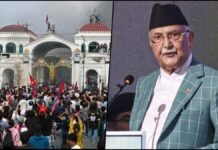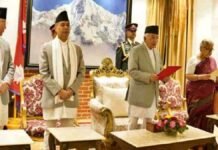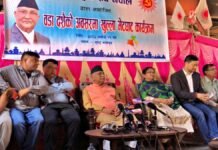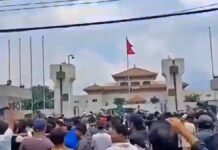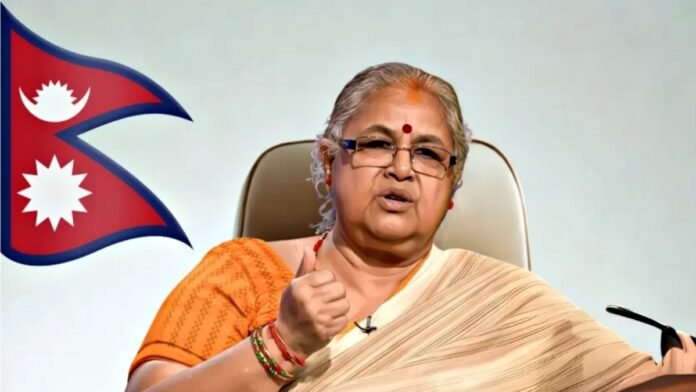
Key Points
- Four crucial ministerial positions finalized for Nepal’s interim government under PM Sushila Karki’s leadership
- Swearing-in ceremony scheduled for September 15, 2025 at Rashtrapati Bhavan to end political instability
- Om Prakash Aryal (Home), Rameshwar Khanal (Finance), Kulman Ghising (Energy), Balanand Sharma (Defense) get key portfolios
- Former cricket captain Paras Khadka expected to lead Youth and Sports Ministry
- Cabinet composition reflects Gen-Z protesters’ demands for transparency and anti-corruption leadership
- Interim government promises fresh elections by March 2026 following Parliament dissolution
- Appointments aim to address economic crisis, energy cooperation with India, and law and order restoration
Kathmandu: Nepal’s interim Prime Minister Sushila Karki has expedited the formation of her cabinet with the finalization of four critical ministerial positions, setting the stage for today’s swearing-in ceremony at Shital Niwas (Presidential Palace). The announcement comes just three days after Karki assumed office following unprecedented Gen-Z-led anti-corruption protests that forced former Prime Minister KP Sharma Oli’s resignation.
President Ramchandra Paudel has received the official list of nominees and confirmed that the swearing-in ceremony will proceed as scheduled on September 15, marking a decisive step toward ending the political uncertainty that has gripped the Himalayan nation for weeks.
Strategic Cabinet Appointments
Home Ministry Leadership
Om Prakash Aryal, a distinguished Supreme Court advocate with an extensive track record in public interest litigation, has been designated as Home Minister. Aryal’s appointment represents a significant shift toward judicial expertise in internal security management, particularly relevant given the recent protest movements and public order concerns.
His legal portfolio includes over 50 Public Interest Litigations (PILs) addressing corruption scandals, police reforms, and civil rights violations. Sources within the interim government suggest that Aryal’s primary mandate will involve comprehensive police force restructuring and implementation of transparent law enforcement protocols demanded by the protest movement.
Economic Recovery Focus
Rameshwar Khanal, Nepal’s former Finance Secretary, assumes the crucial Finance Ministry portfolio amid mounting economic challenges. The appointment comes at a critical juncture as Nepal grapples with foreign exchange shortages, persistent inflation, and reduced remittance inflows affecting the country’s economic stability.
Khanal’s extensive experience includes spearheading budget transparency initiatives and advocating for streamlined tax administration systems. His immediate priorities are expected to include negotiating with international financial institutions for emergency funding and implementing fiscal reforms to restore investor confidence.
Economic analysts view his appointment favorably, citing his previous success in modernizing Nepal’s revenue collection systems and his advocacy for foreign direct investment liberalization policies.
Energy Sector Transformation
Kulman Ghising’s appointment as Energy Minister signals continuity in Nepal’s power sector development strategy. As former Director General of the Nepal Electricity Authority (NEA), Ghising pioneered the elimination of load shedding and accelerated hydropower project implementation across the country.
His tenure is particularly significant for India-Nepal energy cooperation, having negotiated the landmark power trade agreement facilitating 10,000 MW electricity transactions over the next decade. Industry experts anticipate that his leadership will further strengthen bilateral energy partnerships and expedite pending hydropower projects crucial for Nepal’s energy security.
The appointment also addresses Gen-Z concerns about sustainable development and environmental responsibility, as Ghising has consistently advocated for renewable energy expansion and grid modernization initiatives.
Defense and Security Restructuring
Retired Lieutenant General Balanand Sharma’s designation as Defense Minister brings extensive military integration experience to the interim government. His role in successfully incorporating former Maoist combatants into the Nepal Army following the 2006 peace agreement demonstrates his capability in managing sensitive military transitions.
Given the recent political upheaval and the military’s neutral stance during the protests, Sharma’s appointment aims to reinforce civilian oversight of defense institutions while maintaining military professionalism and national security preparedness.
Additional Portfolio Considerations
Youth and Sports Ministry
Former national cricket captain Paras Khadka’s expected appointment as Youth and Sports Minister represents a symbolic gesture toward Gen-Z protesters who demanded meaningful youth representation in governance. Khadka’s sports leadership experience and youth appeal align with the interim government’s commitment to addressing generational concerns in policy-making.
His potential mandate includes developing youth employment programs, sports infrastructure development, and creating platforms for young people’s political participation beyond protest movements.
Infrastructure Development
Industrialist Asim Man Singh Basnet’s anticipated role in the Ministry of Physical Infrastructure and Transport reflects the government’s focus on economic revival through infrastructure investment. His private sector background is expected to bring efficiency and innovation to traditionally bureaucratic infrastructure projects.
Political Crisis Background and Resolution
Genesis of Current Transition
The political transformation began on September 12 when mounting pressure from widespread anti-corruption demonstrations forced KP Sharma Oli’s resignation. The protests, led predominantly by Gen-Z activists, demanded systemic changes in governance, transparency in public administration, and accountability for corruption scandals.
President Paudel’s consultation with protest representatives and Army Chief Ashok Raj Sigdel preceded the decision to install Sushila Karki as interim Prime Minister. The constitutional transition avoided potential violence and maintained democratic continuity despite the political crisis.
Parliament Dissolution and Electoral Timeline
Responding to protesters’ demands, President Paudel dissolved the existing Parliament, paving the way for fresh elections scheduled for March 2026. This timeline allows the interim government adequate preparation for comprehensive electoral reforms and addresses concerns about the legitimacy of the previous legislative assembly.
The dissolution also provides opportunity for new political formations to emerge, potentially reshaping Nepal’s traditional party landscape and incorporating voices from the recent protest movement.
Gen-Z Movement Impact on Governance
Transparency and Anti-Corruption Focus
The cabinet composition directly reflects key demands from the Gen-Z-led movement, emphasizing individuals with established anti-corruption credentials and professional expertise over traditional political loyalties. This approach marks a departure from conventional coalition-building practices in Nepali politics.
Each appointed minister brings specific expertise addressing movement concerns: judicial reform (Aryal), economic transparency (Khanal), sustainable development (Ghising), and institutional accountability (Sharma). This technocratic approach aims to restore public confidence in governmental competence.
Youth Representation and Policy Innovation
The inclusion of younger voices like Paras Khadka and the emphasis on merit-based appointments signal a potential shift toward more inclusive governance structures. The interim government has committed to consulting youth organizations on policy development and maintaining channels for continued civic engagement.
International Implications and Regional Relations
India-Nepal Cooperation
Kulman Ghising’s appointment particularly strengthens prospects for enhanced India-Nepal cooperation in energy and infrastructure development. His previous success in negotiating bilateral agreements and his understanding of regional energy markets position him well to advance ongoing collaborative projects.
The stable interim government also provides reassurance to international partners concerned about Nepal’s political volatility and its impact on regional cooperation initiatives.
China Relations and Balancing Act
The interim government faces the delicate task of maintaining balanced relations with both neighboring powers while addressing domestic priorities. The cabinet’s technocratic composition may provide flexibility in navigating complex geopolitical considerations without the constraints of traditional party alignments.
Road Ahead and Challenges
The interim government must navigate immediate challenges including economic stabilization, maintaining law and order, and preparing for credible elections within the promised timeline. Success will depend on maintaining the momentum of reform while avoiding the political fragmentation that has historically plagued Nepal’s governance.




































